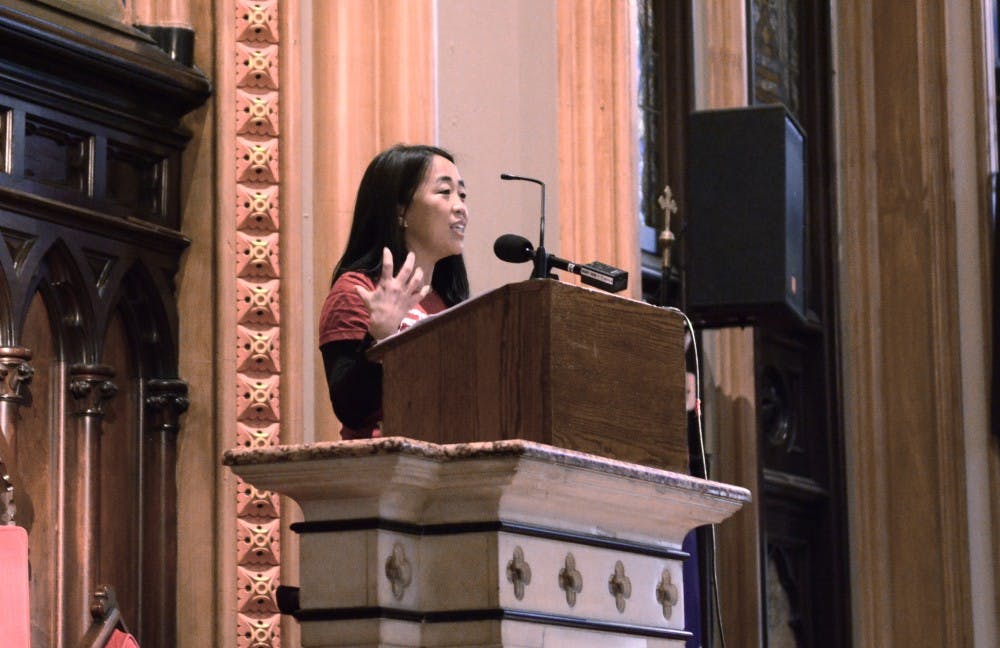
If you manage to catch Helen Gym for five minutes, two of them might be spent on the phone with a school district parent or dropping off materials from Parents United for Public Education for Back to School nights across the city.
Whether it is in-between dropped phone calls on a train home from Washington, D.C., or a weekday morning after explaining to a parent on the phone how to file a complaint through myphillyschools.com, Gym can transition right into an interview about what’s going on in the district without missing a beat.
A former teacher, Penn alumna and school district parent, Gym is a loud voice among the many engaged in the dialogue about affecting changes to the school district — and rallying parents to push back is what Gym and her colleagues at Parents United see as part of the solution.
“The way we talk about young people in schools these days has a really punishing level of approach that is devoid of any level of caring, experiential knowledge and vision, frankly,” she said. “Did I say that bluntly enough?”
When talking about students only in terms of data like test scores or seats in a classroom, she argues, some level of reality gets lost.
Parents United believes that parents constitute a group that is highly qualified to weigh in on what is going wrong in day-to-day realities their children face attending public school in Philadelphia. Since 2006, Parents United has been working to encourage parents around the city to take action on behalf of their children.
“We will be here after all these ed-reform hacks come and go and leadership comes and goes,” Gym said. “We’ll be the ones picking up the pieces of the ed-reform mistakes and promises that they failed to live up to.”
Currently, Parents United is involved with a pending lawsuit along with several district parents against the Pennsylvania Secretary of Education Carolyn Dumaresq. The suit claims that about 825 complaints from parents about curriculum deficiencies and other issues were not investigated properly by the state’s Department of Education, citing Pennsylvania state law. Dumaresq’s office told The Daily Pennsylvanian in early September that the suit was “outrageous.”
“The lawsuit itself is an administrative test case, but the procedure we were going through last year was so incredibly important,” Gym said in reference to the way that parents banded together to file the complaints. Gym said this lawsuit is just a small piece in a larger effort to bring widespread attention to the lack of funding and oversights in the district.
Gym’s activism in Philadelphia stemmed from her involvement, beginning in the early ‘90s, with Asian Americans United, a group that works on community building and support for Asian Americans in Philadelphia.
The director of AAU, Ellen Somekawa, met Gym years ago when she initially became involved with the group. “When we work in communities there [are] these questions about how we establish ethical and reciprocal relationships with communities we work with,” Somekawa said. “I don’t remember her having [an] especially different analysis or understanding. I think she was absorbing things really quickly.”
Gym now serves as a board member of AAU. Among other projects, she and leadership at AAU have helped halt a proposal to open a baseball stadium in the heart of Philadelphia’s Chinatown — and then worked to open Folk Arts-Cultural Treasures Charter School in the nearby area.
With AAU, Gym was part of the group of adults that intervened on behalf of students at South Philadelphia High School who were victims of racial attacks in December of 2009 that resulted in an eight-day student boycott of the school.
Amid the escalating drama, Gym and Somekawa grew close.
“All of a sudden you’re spending 24/7 together trying to figure things out, and Helen was one of the core people that leapt into action,” Somekawa said.
Somekawa said this incident marked one of the times when it had been especially important for adults to come together to support the young people involved. “Part of it was the response to the injuries, the fear, the hurt — and part of it was to raise this as an issue and look at what is the actual injustice here and how we talk about the problem,” she said.
Gym said it’s easy for some to say that nothing ever changes, but that the implications of taking action are much further reaching than some believe.
“What we understand this struggle to be is that things do change and people do advance,” she said. “But the struggle does largely stay the same, because the question of whether we will educate young people with justice and humanity is to be the central challenge of American society today.”
One of the things Gym says she doesn’t understand about the reform movement is the constant refrain: Are you with us or against us?
Advocates encounter this mentality for causes that involve a large institution and actual people who are emotionally effected by the upheavals, like those felt by people whose schools were shut down, Gym said.
“There are plenty of ways that I’m a supporter of the school district and am a critic of their policies,” she said. “We don’t want institutions to be insulated — we want them to strengthened by public debate and feedback.”
The Daily Pennsylvanian is an independent, student-run newspaper. Please consider making a donation to support the coverage that shapes the University. Your generosity ensures a future of strong journalism at Penn.
DonatePlease note All comments are eligible for publication in The Daily Pennsylvanian.







